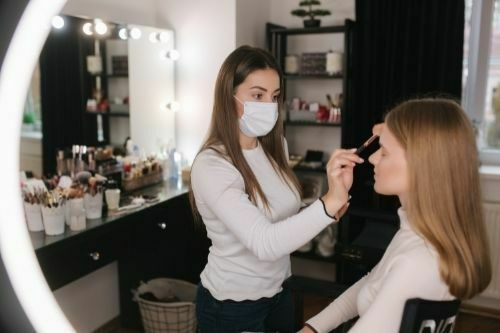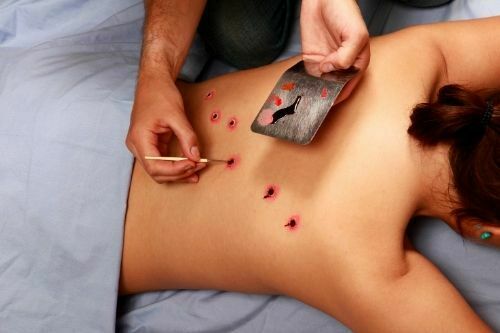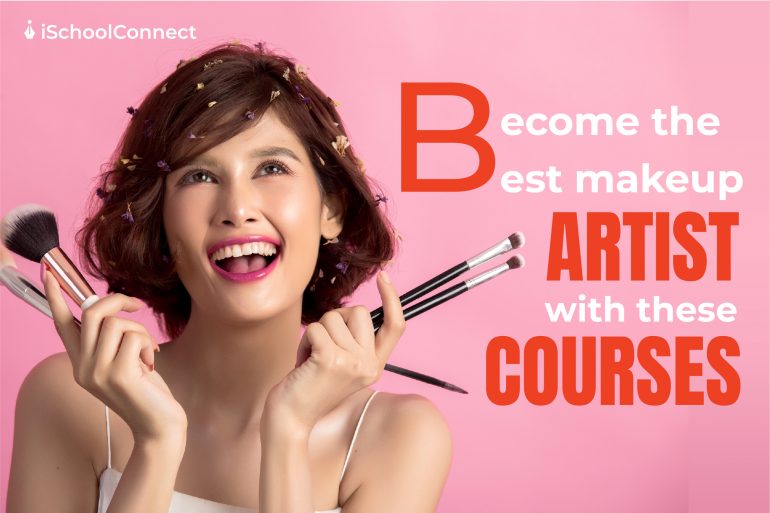Table of Contents
Scope
According to research, the makeup industry is expected to grow to USD 85 billion by 2024, which can also depict the growth in the opportunities of a makeup artist.
Students can choose a professional path based on their interests after completing a professional makeup artist course. Students can work for well-known cosmetics firms as well as on a freelance basis.
Further, They may establish their start-up on the beauty front. Some may also work for event planning companies or as personal groomers and beauty advisers for celebrities. The remuneration is determined by the number of years of experience and the quality of services provided. The wage range expands as the number of years of experience grows.
Skills required to be a makeup artist

It takes more than a degree or a diploma to be a makeup artist. Below is the list of skills that are required to thrive in the field.
- Exceptional knowledge of beauty products
- Interpersonal skills
- Client management skills
- Perseverance
- Readiness to learn
- Proactiveness
Eligibility
Makeup and Beautician courses have no special qualifying requirements. You can enroll in courses provided by India’s best beauty and cosmetics institutions as soon as you complete their 10th grade. Prior experience of cosmetics and beauty is not mandatory though it is considered helpful for you to navigate the right path.
Bachelor’s degrees are the most popular courses to become a makeup artist. Further, you can also opt for a Master’s course. Despite being taught in a traditional model, multiple makeup artist courses online have also appeared on the horizon.
Bachelor’s course
- A makeup artist course duration for a bachelors course is 3 years to complete.
- Bachelor’s or undergraduate courses are available in both general and specialty formats.
- Some of these certified makeup artist courses will require you to pass an entrance exam.
- These courses are taught with the help of activities that give them hands-on experience.
Master’s course
Students who want to take their bachelor’s degrees ahead and want to specialize further can consider pursuing a master’s degree in the field. Some of the most common masters in cosmetology specialties are beautician, stylist, esthetician, makeup artist, hairdresser, and others.
- Master courses sharpen a student’s skills and prepare them to work in more advanced fronts of makeup.
- Entrance tests are used to determine admissions in the master’s course. The UID Exam, UCEED exam, and WLCI AICET exam are some of the entrance tests that may be required.
Specializations for a makeup artist course
Some other hair and makeup artist courses for aspiring professionals include –
Hairstyling courses
Once you’ve completed the cosmetics lesson, you may opt for a basic hairstyling course. This is an elective course that covers a thorough understanding of styling equipment including aspects such as using hot and cold rollers, blow dryers, and hot irons. This further helps you understand how to utilize them to create new hairstyles that improve the appearance for every occasion. They are also taught how to care for and style their hair according to face shapes and events.
Airbrushing courses
This is an elective session in which students learn how to use an airbrush machine correctly and how to apply the right techniques to both the body and the face. Airbrushing technique being a new method is highly recommended for students who want to excel in this field.
Classes in airbrushing include cover tanning and makeup techniques, as well as coloring prosthetics for use in generating special effects for films, television, or theatre. This course may be taken after, alongside, or after the basic makeup artist course.
Special effects makeup

Both a lab and a classroom environment are used to teach special effects or SFX makeup. Students learn how to apply cosmetics to a model’s body and face. Students must experience working with materials such as latex, silicone, and foam rubber during the course, which involves prosthetic casting, sculpting, and painting.
Developing multiple looks with the use of prosthetics, cosmetics, and hair to create intricate effects are covered in the special effects course.
Stage makeup course
Students must learn how to work with a variety of directors who have varying expectations in terms of characters, settings, theatrical lighting, and whether the piece is for the stage, film, or video.
Makeup artists may also be called upon to create historical figures or characters in horror or fictional films. Students will learn how to utilize cosmetics, prosthetics, and other tools to produce bruises, injuries, and abrasions, as well as how to apply the aging effect to performers. Students would be taught techniques to cover their heads with bald caps and create similar drastic looks.
Makeup artist course subjects and syllabus
Here are certain common topics that are covered in makeup artist courses –
| Colours | Advanced facials, cleanups, skin treatment |
| Brow shaping | Corporate/bridal/party make up |
| Corrections and sculpting | Styling |
| Skincare and hygiene | Bleaching, waxing, threading, masques |
| Presentation | Bondo transfers |
| HD makeup for photography, filmography and fashion shows | Makeup techniques and consultation |
| Techniques to work with skin tones | Client management |
| Airbrush techniques for flawless looks | – |
Top universities that offer makeup courses.
Below is the list of the top universities across the globe to opt for makeup courses –
- Makeup Designory (MUD) – New york
- Academy of Freelance Makeup – London, Paris, New York, Belfast, Dubai, and Online
- The Makeup for Ever Academy – Paris
- El school of professional makeup – Los Angeles, California
- Vancouver film school – Vancouver, Canada
- Cinema makeup school – Hollywood, California
- Huxley School of Makeup – Australia
- London college of fashion – London, England
- Chic studios makeup school – New York, Los Angeles, Denver
What we have to say
The requirements for skilled makeup artists have grown substantially in recent years given the pace of the development of the entertainment industry. However, the applications of a skilled makeup artist are not limited to the entertainment industry.
As people begin to realize the value of looking good, so does the need for a makeup artist. The realization of aesthetics in people’s lives has created the emphasis on the same and the career continues to see ever broadening horizons.
FAQ’s
Q1. What aspects does a makeup artist need to be successful in?
Answer – Makeup, brands, latest techniques, history, statistics, skin, face, and color are some of the aspects a makeup artist needs to be successful in.
Q2. Do make-up institutes offer internships?
Answer – Yes, some of the top institutes offer internships to students after the completion of their courses.
Q3. Can I take up the makeup artist course after the 10th?
Answer – Yes, you can opt for a makeup artist course after the 10th.






